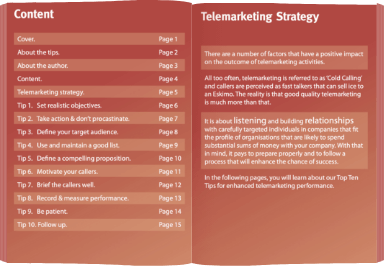Both large and small organisations continue to use telemarketing as a weapon in their business development armoury. That’s despite the arrival of newer methods of marketing outreach. So, why is telemarketing still popular? Surely, this form of business development is outdated. Social media marketing, the drive towards content and demand generation, pull versus push, and other more ‘modern’ forms of business development, have surely taken over from this form of marketing
The Personal Touch
Using the phone to promote goods and services has been prevalent since the late 70s. Simply speaking, it persists since it is still effective. Crucially, it offers an all-important form of personalised engagement that leads to sales. Calling does not always mean direct sales or hard-sell. Rather, it can be used in various ways to build rapport as part of the sales process. After all, it is human. And, rarely do high value sales take place without personal intervention.
It Takes Time and Skill
This method of business lead generation isn’t necessarily an inexpensive route to market. You’re paying for a caller to pick up the phone to promote your products or services. This takes time, experience, and patience, and by no means limited skill. The individual that picks up the phone represents your brand and company and, as such, must present a professional face of your business. This is not a remote, anonymous transaction.
Despite both the skill and challenges involved, from time to time, prospective clients ask us to work on a commission-only basis as opposed to being paid for the work we carry out. Some clients even ask for a remuneration basis solely based on their conversion to actual sales. Others just want to pay for each lead created to an agreed set of criteria. These criteria are usually quite tight.
Why Pay for Something that doesn’t Add Value?
This principle is good. However, does every purchase you’ve ever made, both personally and in business, work out? It doesn’t mean that it might not work for others, or at another time. It just isn’t right for your needs right now. Or, perhaps it isn’t quite what you expected.
Are other forms of marketing foolproof? Are PR, advertising, social media marketing and the like paid purely on successful outcomes? Unfortunately, little is guaranteed in life and business.
I regularly use the expression:
“If it was that easy, everyone would do it themselves and there would be no need for marketing”.
Business Development is Far From Easy
Marketing options are wide and varied. No one knows which will work best. There is no crystal ball in business. What’s more, business solutions are often commoditised in that there are multiple suppliers, with similar offerings, chasing the same customers. And, those customers often have incumbent suppliers that are entrenched, and contracted.
Given that there is limited, if any, true differentiation amongst suppliers, it’s easy to see why lead generation efforts can become challenging. In addition, identifying the right job role, and the specific individual, that actually makes the purchase decision for a given product or service can also be somewhat foggy. In this scenario, you can begin to understand the challenge.
Commoditisation is the Rule not the Exception
The reality of b2b marketing is that commoditisation is the norm. Differentiation is difficult to prove. And, most companies’ marketing communication talks the talk but how do you prove that they walk the walk?
Buyers find it difficult to decipher truth from fiction. Customers are also increasingly time poor. They have pressure from their shareholders, their parent company, their boss, clients, staff and so on. So, at the point of contact, marketing has a tough job to do. Couple this with the fact that b2b data is well-known to be far short of 100% in terms of accuracy, and you have a recipe for disaster if decisions on audience and message definition aren’t well coordinated.
Playing by the Same Rules
So why is it that companies will still happily, or resignedly, pay for advertisements that are reactive (i.e. you have to wait for response), for direct mail (much of which ends up in the bin), for shiny ew websites (that often don’t drive enquiries) for PR (that doesn’t either reach the target audience or doesn’t drive response), and for email marketing with woeful open and click-through rates?
Yet when it comes to a proactive route to market where a qualified telemarketer actually picks up the phone to a defined prospect and has a conversation, suddenly clients want to only pay by results. Why is that the case?
Where is the Value in Using the Phone?
Of course, it sounds like I’m moaning. The reality of using telemarketing as a route to market is that the cost is in the time taken to devise a robust strategy to reach a decision-maker. Then, it’s about convincing them to take action. That’s also where the skill resides especially when a client doesn’t know the best market at which to aim, and hasn’t got a defined USP.
It’s conceivable that only 15% of all calls actually reach your decision-maker. That’s not least because data is inaccurate to start with, and the existence of voicemails, out of office and so on. Once you do get through to the organisation, the senior decision-makers to whom you want to talk are usually shielded by gatekeeper PA’s, voicemail and so on.
Therefore, once you reach them, you’d better have something compelling to say. It isn’t enough to be great at what you do or to have fantastic clients or credentials. Your prospect probably already has an incumbent supplier that does exactly what you do. So you really need to give prospects a reason to believe you, to see you and to engage with you.
Working Collaboratively
Ultimately, payment by results for telemarketing is a valid request and is definitely an option. However, to make it work, it has to be a two-way process. As mentioned above,there must be accurate data which, in most cases, means an exercise to clean the data before commencement to identify the exact decision-maker required.
It must respect and reflect the fact that most services aren’t differentiated and therefore do not entice the prospective client. It’s important to recognise that it takes time to get past voicemail and rottweiler PA’s who shield decision-makers from undifferentiated commoditised propositions.
Decision-makers are also time poor and fatigued by marketing overload from every conceivable channel. Consideration should be given to the time investment by the telemarketer. They deserve support, input, encouragement and payment for what is, after all, a pretty thankless task. In many cases, 90% of people will say no since they aren’t in the market for a new solution. It takes persistence and skill to convince the person on the other end of the phone to take positive action as a result of the call. And it has to recognise that, for a whole host of reasons, your caller may not be able to convert a new business appointment to business quickly, or even at all.
Telemarketing is Direct and Proactive
Despite the challenges, telemarketing is a direct, effective and possibly the most proactive method of lead generation and marketing in the b2b sector. It is not the only method. Indeed it is crucial that it’s part of an integrated strategy. Your approach should consider multiple routes to market. However, if done professionally it can position your brand favourably and generate immediate leads that often do not result in a pitch situation with multiple suppliers. The reason for this is that a call can often unearth a latent need. And, if you can prove that you can do the job, you can often get in before your competition.
So when you consider how you are going to reach your target audience, please consider all of the factors that lead to successful outbound calling and don’t simply view it as the telemarketer’s job to prove that they’re good by working on a ‘payment by results’ basis. After all, when was the last time you were paid like that for your services?






